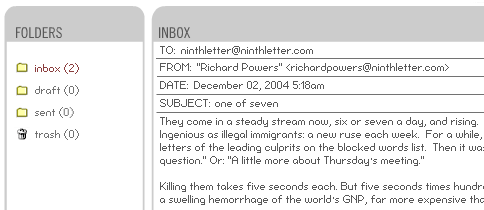Branching off our recent believable character discussion, I’d like to say something about writing, gameplay, and their interrelation. In that discussion, Ian W. suggested:
[Writers] are not likely to be engineers. Even if they are the roles are very different and their tools should reflect that.
I’d say, the roles aren’t very different actually. In fact, it will become necessary for writers to be engineers.
How are the roles not very different? Writers in any medium are creators of character behavior; they invent motivations for characters, and from that create what their characters do and say. In non-interactive media, such as books and plays, as a writer works, she plays these behaviors out in her mind and narrates them into pages of text. In interactive media, such as games, the behaviors themselves are written down, as procedures — pages of code annotated with surface text. The computer executes this program, animating the characters to speak and act. In each approach, the writer’s thought processes are very similar! Sure, it may be more work to write down the behaviors themselves, than to simulate them in your mind and narrate the results, but the creative thinking behind both is similar. It takes some training to learn how to write behaviors — that is, to program — but it’s do-able. If a writer for a game is only creating sentences of dialog, then she is only doing a subset of the actual task of writing; the engineer who coded the behaviors that play out the dialog has actually been a co-writer all along. And — all this answers why writers need to be engineers, or at least collaborate very closely together.
Ian W. also wrote,
would interactive writing really be procedural when the field is more mature?
I’ll flip this around — interactive writing will be more mature when it becomes procedural.
This is a preview of
Head Games
.
Read the full post.




 We’re gutted, and we may never again check the price tag on a GameCube. Jeff Minter’s spectacular and innovative project
We’re gutted, and we may never again check the price tag on a GameCube. Jeff Minter’s spectacular and innovative project 



